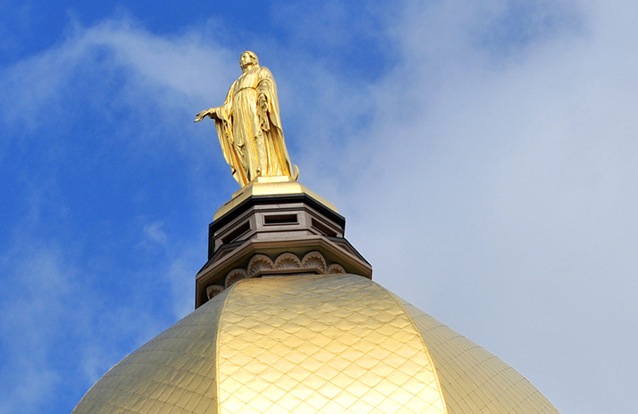Everyone hates filling out insurance forms. But since when has requiring some paperwork been a breach of the Constitution? Since the Affordable Care Act went into effect, according to the University of Notre Dame.
The 7th Circuit Court of Appeals heard oral arguments yesterday on Notre Dame’s challenge to a part of the new health law known as the contraceptive mandate. The Catholic university is one of dozens of religious nonprofits around the country challenging the law. (Last month, the Supreme Court made headlines by granting a temporary injunction to Little Sisters of the Poor in its similar lawsuit.)
The plaintiffs in these cases portray their efforts as a defense against government interference with their religious freedom. In fact, their arguments go much further than that.
The first thing to know about these organizations is that they are not required to provide contraception coverage to their employees. The Affordable Care Act generally requires employers who offer health insurance to include such coverage in their plans, but the law contains an opt-out provision for religiously affiliated nonprofit organizations.
To get out of providing contraceptive coverage, a religious nonprofit simply has to fill out a form in which it certifies that it considers itself a religious organization and that it opposes providing the coverage. Then it must send the form to the issuer of its group plan or the administrator of its self-insurance plan, who is required by law to arrange for separate payments to provide the employees with free contraceptive care.
It’s filling out the form that Notre Dame objects to. In its complaint, the school argues that the form “triggers the provision of ‘free’ objectionable coverage to Notre Dame’s employees in a manner contrary to its beliefs.” The problem, according to the religious organizations behind these lawsuits, is that submitting the self-certification form makes them complicit by setting the contraception coverage in motion.
Key to this objection is the idea, as Little Sisters of the Poor put it in their Supreme Court brief, that signing the form would “deputize a third party to sin on their behalf.” Under this view, the insurance company or plan administrator is like a Shabbos goy, someone you get to do something God won’t let you do yourself.
But no one is making the Little Sisters or Notre Dame “deputize” anyone. Rather, it’s the law itself that sets up different obligations for different parties. If you’re the objecting religious employer, your obligation is to fill out the form. If you’re the administrator of the employer’s plan, your obligation is to arrange for separate payments. The form itself doesn’t authorize anyone; it simply notifies the relevant party of its responsibilities.
In fact, the form is a red herring. To see how truly radical Notre Dame’s argument is, imagine that the law required the federal government, rather than insurance companies, to arrange contraceptive coverage for anyone whose employer-provided insurance didn’t include it, regardless of whether the employer signs any form. By Notre Dame’s logic, even this setup would be unconstitutional because its choice to not cover contraceptives would still be the “trigger” that forces the government to step in and provide coverage. But if that’s so, then who could legally provide coverage that these employers object to?
No one. If we accept Notre Dame’s argument, assigning any third party the duty to provide contraceptive coverage that the school objects to would violate its religious freedom, because its act of refusal is what makes the third party’s duty kick in. So the right Notre Dame is actually claiming isn’t the right to not have to pay for contraceptive care; it’s the right to prevent anyone else from doing so.
These religiously affiliated employers can’t legally forbid their employees from buying contraceptives with their own money. Their lawsuits are an attempt to do the next best thing: forbid anyone else from making contraceptives affordable to the people who work for them.
Gilad Edelman is a writer and a student at Yale Law School.









